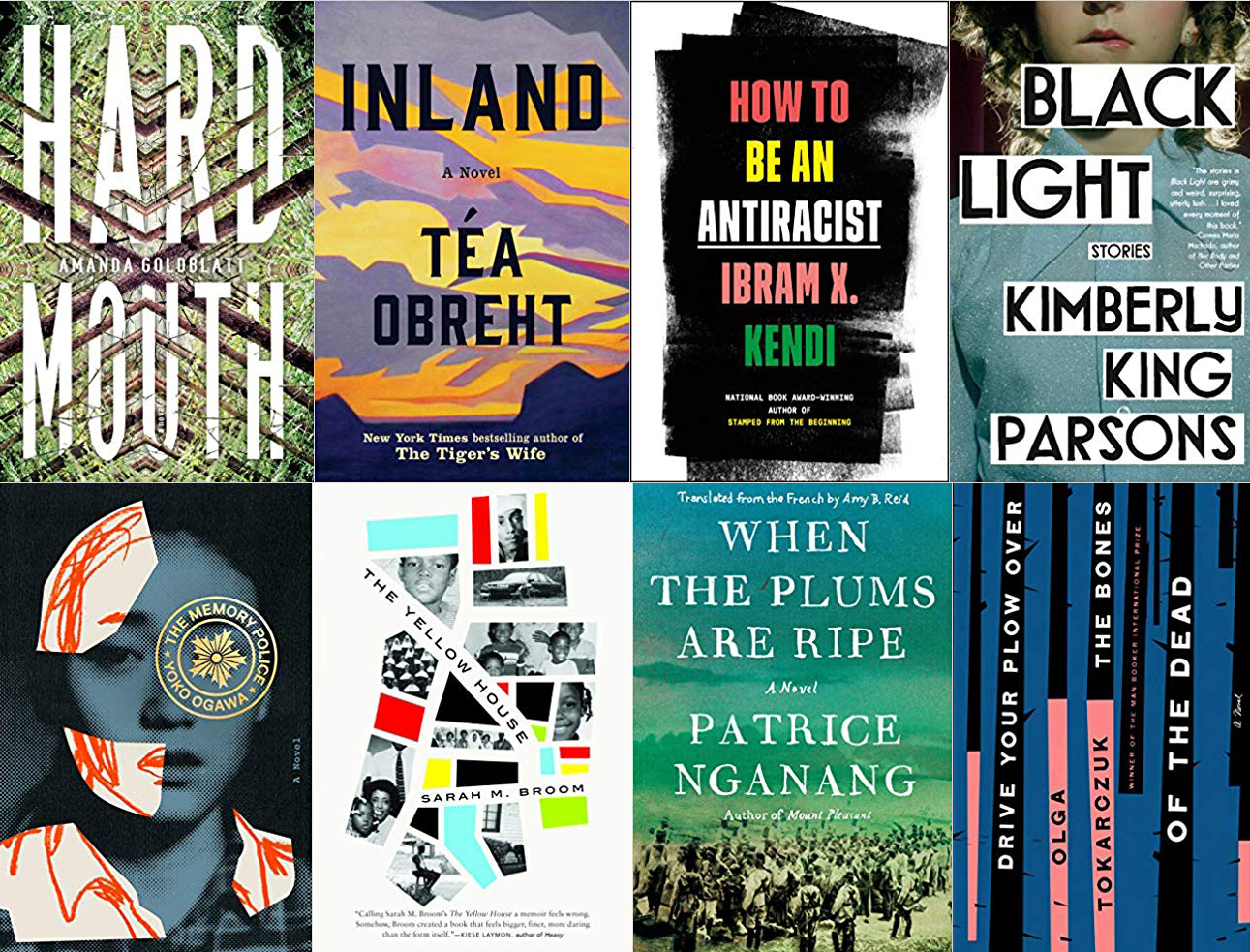Here’s a quick look at some notable books—new titles from the likes of Téa Obreht, Olga Tokarczuk, Patrice Nganang, Kimberly King Parsons (whom we interviewed recently), Ibram X. Kendi, and more—that are publishing this week.
Want to learn more about upcoming titles? Then go read our most recent book preview. Want to help The Millions keep churning out great books coverage? Then sign up to be a member today.
Inland by Téa Obreht
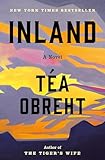 Here’s what Publishers Weekly had to say about Inland: “The unrelenting harshness of existence in the unsettled American West sharply focuses what Obreht (The Tiger’s Wife) refers to as ‘the uncertain and frightening textures of the world’ in this mesmerizing historical novel spun from two primary narrative threads. In one, homesteader Nora Lark waits with her son and niece for the return of her newspaperman husband with a supply of badly needed water for their house in Amargo, in the Arizona Territory in 1893. In the other, outlaw Lurie Mattie flees a warrant for murder by taking refuge in the Camel Corps, an all-but-forgotten experiment in history to import camels as beasts of burden in the 19th-century American Southwest. As Nora’s and Lurie’s paths gradually converge, Obreht paints a colorful portrait of the Western landscape, populated by a rogue’s gallery of memorable characters and saturated with spirits of the countless dead who attain a tangible presence, if only through the conversations they conduct in the minds of the characters whom they haunt. The novel’s unforgettable finale, evocative and grimly symbolic, crystallizes its underlying themes of how inconsolable grief and unforgivable betrayal shape the circumstances that bind its characters to their fates. Obreht knocks it out of the park in her second novel.”
Here’s what Publishers Weekly had to say about Inland: “The unrelenting harshness of existence in the unsettled American West sharply focuses what Obreht (The Tiger’s Wife) refers to as ‘the uncertain and frightening textures of the world’ in this mesmerizing historical novel spun from two primary narrative threads. In one, homesteader Nora Lark waits with her son and niece for the return of her newspaperman husband with a supply of badly needed water for their house in Amargo, in the Arizona Territory in 1893. In the other, outlaw Lurie Mattie flees a warrant for murder by taking refuge in the Camel Corps, an all-but-forgotten experiment in history to import camels as beasts of burden in the 19th-century American Southwest. As Nora’s and Lurie’s paths gradually converge, Obreht paints a colorful portrait of the Western landscape, populated by a rogue’s gallery of memorable characters and saturated with spirits of the countless dead who attain a tangible presence, if only through the conversations they conduct in the minds of the characters whom they haunt. The novel’s unforgettable finale, evocative and grimly symbolic, crystallizes its underlying themes of how inconsolable grief and unforgivable betrayal shape the circumstances that bind its characters to their fates. Obreht knocks it out of the park in her second novel.”
Drive Your Plow over the Bones of the Dead by Olga Tokarczuk (translated by Antonia Lloyd-Jones)
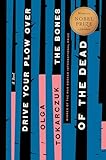 Here’s what Publishers Weekly had to say about Drive Your Plow into the Bones of the Dead: “Tokarczuk follows her Man Booker International winner Flights with an astounding mystical detective novel. Narrator Janina Duszejko, an English teacher and winter caretaker for a few summer houses in an isolated Polish hamlet near the Czech border, is awakened one night by her neighbor, whom she calls Oddball, who informs her that their neighbor, nicknamed Big Foot, is dead in his house. Before the police arrive, Janina and Oddball find a deer bone in Big Foot’s mouth. Soon another body turns up, and Janina, an avid creator of horoscopes and, more generally, prone to theorizing and ascribing incidents to larger systems, develops a theory that animals are killing the locals. As the body count rises, readers are treated to Janina’s beliefs (‘Finally, transformed into tiny quivering photons, each of our deeds will set off into Outer Space, where the planets will keep watching it like a film until the end of the world’), descriptions (a body is ‘a troublesome piece of luggage’), and observations (flowers in a garden ‘are neat and tidy, standing straight and slender, as if they’d been to the gym’). Tokarczuk’s novel succeeds as both a suspenseful murder mystery and a powerful and profound meditation on human existence and how a life fits into the world around it. Novels this thrilling don’t come along very often.”
Here’s what Publishers Weekly had to say about Drive Your Plow into the Bones of the Dead: “Tokarczuk follows her Man Booker International winner Flights with an astounding mystical detective novel. Narrator Janina Duszejko, an English teacher and winter caretaker for a few summer houses in an isolated Polish hamlet near the Czech border, is awakened one night by her neighbor, whom she calls Oddball, who informs her that their neighbor, nicknamed Big Foot, is dead in his house. Before the police arrive, Janina and Oddball find a deer bone in Big Foot’s mouth. Soon another body turns up, and Janina, an avid creator of horoscopes and, more generally, prone to theorizing and ascribing incidents to larger systems, develops a theory that animals are killing the locals. As the body count rises, readers are treated to Janina’s beliefs (‘Finally, transformed into tiny quivering photons, each of our deeds will set off into Outer Space, where the planets will keep watching it like a film until the end of the world’), descriptions (a body is ‘a troublesome piece of luggage’), and observations (flowers in a garden ‘are neat and tidy, standing straight and slender, as if they’d been to the gym’). Tokarczuk’s novel succeeds as both a suspenseful murder mystery and a powerful and profound meditation on human existence and how a life fits into the world around it. Novels this thrilling don’t come along very often.”
The Yellow House by Sarah M. Broom
 Here’s what Publishers Weekly had to say about The Yellow House: “Broom presents a great, multigenerational family story in her debut memoir. At its center is Broom’s dilapidated childhood home—a source of both division and unity in the family. Broom’s mother, Ivory Mae, bought the house, located in New Orleans East, in 1961; the budding area then succumbed to poverty and crime in the late 1980s. Broom connects the house’s physical decline to the death in 1980 of her father, Simon, who left many unfinished repair projects. The house had a precarious staircase, electrical problems, and holes that attracted rodents and cockroaches. Broom recalls living in an increasingly unwelcoming environment: ‘When would the rats come out from underneath the sink?’ she wonders. Broom eventually left New Orleans—she attended college in Texas and got a job in New York—but returned after Hurricane Katrina. Through interviews with her brother, Carl, she vividly relays Katrina’s impact on families. Broom is an engaging guide; she has some of David Simon’s effortless reporting style, and her meditations on eroding places recall Jeannette Walls. The house didn’t survive Katrina, but its destruction strengthened Broom’s appreciation of home. Broom’s memoir serves as a touching tribute to family and a unique exploration of the American experience.”
Here’s what Publishers Weekly had to say about The Yellow House: “Broom presents a great, multigenerational family story in her debut memoir. At its center is Broom’s dilapidated childhood home—a source of both division and unity in the family. Broom’s mother, Ivory Mae, bought the house, located in New Orleans East, in 1961; the budding area then succumbed to poverty and crime in the late 1980s. Broom connects the house’s physical decline to the death in 1980 of her father, Simon, who left many unfinished repair projects. The house had a precarious staircase, electrical problems, and holes that attracted rodents and cockroaches. Broom recalls living in an increasingly unwelcoming environment: ‘When would the rats come out from underneath the sink?’ she wonders. Broom eventually left New Orleans—she attended college in Texas and got a job in New York—but returned after Hurricane Katrina. Through interviews with her brother, Carl, she vividly relays Katrina’s impact on families. Broom is an engaging guide; she has some of David Simon’s effortless reporting style, and her meditations on eroding places recall Jeannette Walls. The house didn’t survive Katrina, but its destruction strengthened Broom’s appreciation of home. Broom’s memoir serves as a touching tribute to family and a unique exploration of the American experience.”
The Memory Police by Yoko Ogawa (translated by Stephen Snyder)
 Here’s what Publishers Weekly had to say about The Memory Police: “Ogawa (Revenge) returns with a dark and ambitious novel exploring memory and power—both individual and institutional—through a dystopian tale about state surveillance. The unnamed female narrator is an orphaned novelist living on an unnamed island that is in the process of disappearing, item by item. The disappearances, of objects such as ribbons, perfume, birds, and calendars, are manifested in a physical purge of the object as well as a psychological absence in the island’s residents’ memories. The mysterious and brutal Memory Police are in charge of enforcing these disappearances, randomly searching homes and arresting anyone with the ability to retain memory of the disappeared, including the narrator’s mother. When the narrator discovers her editor, R, is someone who does not have the ability to forget, she builds a secret room in her house to hide him, with the help of her former nurse’s husband, an old man who once lived on the ferry, which has also disappeared. Though R may not leave the room for fear of discovery, he, the narrator, and the old man are able to create a sense of home and family. However, the disappearances and the Memory Police both grow more aggressive, with more crucial things disappearing at a faster rate, and it becomes clear that it will be impossible for them—their family unit, and the island as a whole—to continue. The classic Ogawa hallmarks are here, a dark eroticism and idiosyncratic characters, but it’s also clear she’s expanded her range into something even deeper. This is a searing, vividly imagined novel by a wildly talented writer.”
Here’s what Publishers Weekly had to say about The Memory Police: “Ogawa (Revenge) returns with a dark and ambitious novel exploring memory and power—both individual and institutional—through a dystopian tale about state surveillance. The unnamed female narrator is an orphaned novelist living on an unnamed island that is in the process of disappearing, item by item. The disappearances, of objects such as ribbons, perfume, birds, and calendars, are manifested in a physical purge of the object as well as a psychological absence in the island’s residents’ memories. The mysterious and brutal Memory Police are in charge of enforcing these disappearances, randomly searching homes and arresting anyone with the ability to retain memory of the disappeared, including the narrator’s mother. When the narrator discovers her editor, R, is someone who does not have the ability to forget, she builds a secret room in her house to hide him, with the help of her former nurse’s husband, an old man who once lived on the ferry, which has also disappeared. Though R may not leave the room for fear of discovery, he, the narrator, and the old man are able to create a sense of home and family. However, the disappearances and the Memory Police both grow more aggressive, with more crucial things disappearing at a faster rate, and it becomes clear that it will be impossible for them—their family unit, and the island as a whole—to continue. The classic Ogawa hallmarks are here, a dark eroticism and idiosyncratic characters, but it’s also clear she’s expanded her range into something even deeper. This is a searing, vividly imagined novel by a wildly talented writer.”
When the Plums Are Ripe by Patrice Nganang
 Here’s what Publishers Weekly had to say about When the Plums Are Ripe: “Nganang continues his rich, complex saga of WWII-era Cameroon with this second volume in a trilogy, after Mount Pleasant. Pouka the poet has returned to his village of Édéa after being educated by the French in the capital city of Yaounde. Fancying himself a man of letters, he starts a poetry group in the local bar. However, upon the fall of France to the Nazis, the poets are quickly thrown into the fighting that has spread throughout North Africa. Readers move from Pouka’s story to that of the poets under the questionable and racist leadership of French general Leclerc. Through the bloody battles of Kufra and Murzur in Libya, Nganang confronts the horrible history of French colonialism: the French’s use of ‘black soldiers for cannon fodder’ in fighting the Axis powers; villagers armed with nothing but machetes, killed by the thousands. With a narrative structure reminiscent of African oral traditions, an unknown narrator heralds these men for their deeds and weeps for the sons and daughters of Cameroon: the young men who shed their blood for a Western country and the young women left behind, whose bodies were exploited and raped. With lyrical, soaring prose, Nganang sings their song, challenging the Euro-written history of colonialism and replacing it with a much-needed African one. The result is a challenging but indispensable novel.”
Here’s what Publishers Weekly had to say about When the Plums Are Ripe: “Nganang continues his rich, complex saga of WWII-era Cameroon with this second volume in a trilogy, after Mount Pleasant. Pouka the poet has returned to his village of Édéa after being educated by the French in the capital city of Yaounde. Fancying himself a man of letters, he starts a poetry group in the local bar. However, upon the fall of France to the Nazis, the poets are quickly thrown into the fighting that has spread throughout North Africa. Readers move from Pouka’s story to that of the poets under the questionable and racist leadership of French general Leclerc. Through the bloody battles of Kufra and Murzur in Libya, Nganang confronts the horrible history of French colonialism: the French’s use of ‘black soldiers for cannon fodder’ in fighting the Axis powers; villagers armed with nothing but machetes, killed by the thousands. With a narrative structure reminiscent of African oral traditions, an unknown narrator heralds these men for their deeds and weeps for the sons and daughters of Cameroon: the young men who shed their blood for a Western country and the young women left behind, whose bodies were exploited and raped. With lyrical, soaring prose, Nganang sings their song, challenging the Euro-written history of colonialism and replacing it with a much-needed African one. The result is a challenging but indispensable novel.”
Black Light by Kimberly King Parsons
 Here’s what Publishers Weekly had to say about Black Light: “Parsons’s debut crackles with the frenetic energy of the women who stalk its pages. In opening story ‘Guts,’ Sheila has just started dating ‘almost-doctor’ Tim, whose particular brand of condescending masculine practicality destabilizes her already-erratic lifestyle. In ‘Foxes,’ a recently divorced mother recounts her courtship and marriage to her ex-husband, whom she calls ‘the fool,’ as she listens to her young daughter spin a story featuring knights and inky enemies, and the two stories begin to intertwine and mimic the cadences of each other. ‘Foxes’ kicks off a dazzling run of stories, including ‘The Soft No,’ in which a pair of siblings must navigate neighborhood politics as well as their unpredictable mother, to ‘We Don’t Come Natural to It,’ in which two women’s pursuit of beauty becomes a vortex of self-inflicted violence, control, and mistrust. In the title story, a young woman watches as her former lover evolves into someone she realizes she never knew, while she must navigate the breakup in a way that doesn’t out her sexuality. Parsons’s characters are sharp and uncannily observed, bound up in elastic and electrifying prose. This is a first-rate debut.”
Here’s what Publishers Weekly had to say about Black Light: “Parsons’s debut crackles with the frenetic energy of the women who stalk its pages. In opening story ‘Guts,’ Sheila has just started dating ‘almost-doctor’ Tim, whose particular brand of condescending masculine practicality destabilizes her already-erratic lifestyle. In ‘Foxes,’ a recently divorced mother recounts her courtship and marriage to her ex-husband, whom she calls ‘the fool,’ as she listens to her young daughter spin a story featuring knights and inky enemies, and the two stories begin to intertwine and mimic the cadences of each other. ‘Foxes’ kicks off a dazzling run of stories, including ‘The Soft No,’ in which a pair of siblings must navigate neighborhood politics as well as their unpredictable mother, to ‘We Don’t Come Natural to It,’ in which two women’s pursuit of beauty becomes a vortex of self-inflicted violence, control, and mistrust. In the title story, a young woman watches as her former lover evolves into someone she realizes she never knew, while she must navigate the breakup in a way that doesn’t out her sexuality. Parsons’s characters are sharp and uncannily observed, bound up in elastic and electrifying prose. This is a first-rate debut.”
How to Be an Antiracist by Ibram X. Kendi
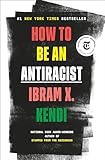 Here’s what Publishers Weekly had to say about How to Be an Antiracist: “Kendi follows his National Book Award–winning Stamped from the Beginning with a boldly articulated, historically informed explanation of what exactly racist ideas and thinking are, and what their antiracist antithesis looks like both systemically and at the level of individual action. He weaves together cultural criticism, theory (starting each chapter with epigraph-like definitions of terms), stories from his own life and philosophical development (he describes his younger self as a ‘racist, sexist homophobe’), and episodes from history (including the 17th-century European debate about ‘polygenesis,’ the idea that different races of people were actually separate species with distinct origins). He delves into typical racist ideas (e.g. that biology and behavior differ between racial groups) and problems (such as colorism), as well as the intersections between race and gender, race and class, and race and sexuality. Kendi puts forth some distinctive arguments: he posits that ‘internalized racism is the true Black-on-Black crime,’ critiquing powerful black people who disparage other black people and racializing behaviors they disapprove of, and argues that black people can be racist in their views of white people (when they make negative generalizations about white people as a group, thereby espousing the racist idea that ethnicity determines behavior). His prose is thoughtful, sincere, and polished. This powerful book will spark many conversations.”
Here’s what Publishers Weekly had to say about How to Be an Antiracist: “Kendi follows his National Book Award–winning Stamped from the Beginning with a boldly articulated, historically informed explanation of what exactly racist ideas and thinking are, and what their antiracist antithesis looks like both systemically and at the level of individual action. He weaves together cultural criticism, theory (starting each chapter with epigraph-like definitions of terms), stories from his own life and philosophical development (he describes his younger self as a ‘racist, sexist homophobe’), and episodes from history (including the 17th-century European debate about ‘polygenesis,’ the idea that different races of people were actually separate species with distinct origins). He delves into typical racist ideas (e.g. that biology and behavior differ between racial groups) and problems (such as colorism), as well as the intersections between race and gender, race and class, and race and sexuality. Kendi puts forth some distinctive arguments: he posits that ‘internalized racism is the true Black-on-Black crime,’ critiquing powerful black people who disparage other black people and racializing behaviors they disapprove of, and argues that black people can be racist in their views of white people (when they make negative generalizations about white people as a group, thereby espousing the racist idea that ethnicity determines behavior). His prose is thoughtful, sincere, and polished. This powerful book will spark many conversations.”
Hard Mouth by Amanda Goldblatt
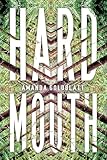 Here’s what Publishers Weekly had to say about Hard Mouth: “Goldblatt’s propulsive and beguiling debut tracks the story of a young woman searching for escape. Twenty-something Denny, short for Denise, has watched her father suffer on and off from cancer for 10 years and moves through her days in a fog of half-hope and half-grief, ‘working on the idea of being alive.’ She works a quiet job in a genetics lab and spends most nights alone in her studio apartment in the Washington, D.C., suburbs, socializing only with her high school best friend Ken and her imaginary friend, Gene, an amalgam of classic movie–character clichés. But when her father’s cancer returns, and Denny learns he won’t be seeking treatment, Denny decides to take time off and rent a cabin deep in the woods, leaving no word with the people she leaves behind. Cut off from civilization, the unexpected becomes the everyday, and Denny’s inner turmoil is matched by the brutality she must endure to survive, particularly after a storm downs a tree that tears open the roof and exposes her to the elements—and even more so when she discovers that she might not be alone out there. Denny’s story gains momentum early on, though the secondary characters too often come across as one-note, muddled shapes in the background. Still, this debut is a striking psychological portrait of despair.”
Here’s what Publishers Weekly had to say about Hard Mouth: “Goldblatt’s propulsive and beguiling debut tracks the story of a young woman searching for escape. Twenty-something Denny, short for Denise, has watched her father suffer on and off from cancer for 10 years and moves through her days in a fog of half-hope and half-grief, ‘working on the idea of being alive.’ She works a quiet job in a genetics lab and spends most nights alone in her studio apartment in the Washington, D.C., suburbs, socializing only with her high school best friend Ken and her imaginary friend, Gene, an amalgam of classic movie–character clichés. But when her father’s cancer returns, and Denny learns he won’t be seeking treatment, Denny decides to take time off and rent a cabin deep in the woods, leaving no word with the people she leaves behind. Cut off from civilization, the unexpected becomes the everyday, and Denny’s inner turmoil is matched by the brutality she must endure to survive, particularly after a storm downs a tree that tears open the roof and exposes her to the elements—and even more so when she discovers that she might not be alone out there. Denny’s story gains momentum early on, though the secondary characters too often come across as one-note, muddled shapes in the background. Still, this debut is a striking psychological portrait of despair.”
Also on shelves: I Heart Oklahoma! by Roy Scranton.
